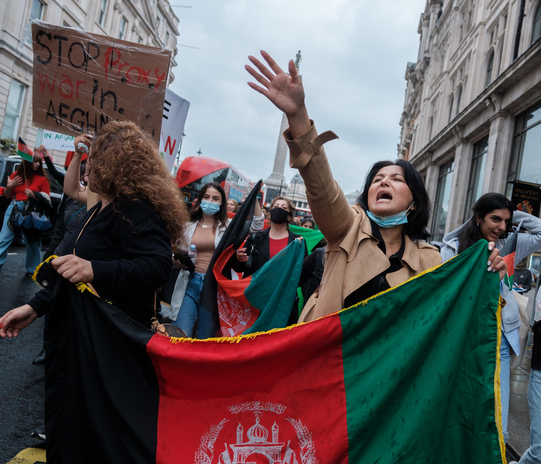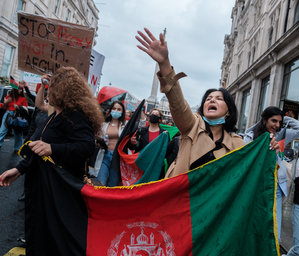The Taliban emerged in the 1990s when Soviet Troops were removed from Afghanistan to establish “peace and security and [enforcing their version] of Sharia, or Islamic law once in power.” The Taliban began expanding their influence and by 1998 had gained control of almost 90 percent of Afghanistan. They were popular with the Afghan civilians at first, seeing as they were viewed as somewhat of a saving grace in the absence of the fighting that was present in the driving out of the Soviet Union. Soon enough, however, the Taliban began applying their by-the-book interpretation of Sharia Law which included public executions for major criminals and amputation of limbs for those convicted of theft. The Taliban strongly enforced censorship—banning television and music and discouraging girls over 10-years-old from attending school. They even destroyed Buddha statues despite strong opposition and outrage erupting all over Afghanistan.
In 2001 on Sept. 11, the United States of America underwent a series of attacks on the World Trade Center in New York and the Pentagon in Washington, D.C. The prime suspects for the attacks were Osama Bin Laden and his Islamic-extremist group, al-Qaeda. The Taliban were accused of providing protection and sanctuary to the suspects—leading the U.S. to launch a series of attacks in Afghanistan in October of 2001 and the collapse of the Taliban regime in December of 2001. The U.S. vowed to support the prevailing of democracy in Afghanistan and ensure the disappearance of the terrorist threat.
Although the Taliban were removed from power by U.S. military forces in 2001, their presence never fully disintegrated and attacks on U.S. troops and Afghan civilians continued for years on end. As years passed, it was increasingly difficult to maintain a hold on the territory and prevent violence and destruction. The United States shifted their focus to their war with Iraq and upon this distraction, the Taliban took this as an opportunity to regain power in certain regions in the countryside of Afghanistan. In 2020, former President Donald Trump announced the plan to retreat troops from Afghanistan—along with signing a deal with the Taliban which “limited U.S. military action against them.” President Joe Biden then announced the removal of the remaining troops by the end of August 2021. As August came to a close, the Taliban took the final removal of U.S. troops as an opportunity to take over almost every city in Afghanistan.
Security forces in Afghanistan, which the U.S. and its NATO allies equipped, are thought to be filled with corruption and have been for some time now. These forces surrendered easily to Taliban troops as a result of a lack of resources, food and supplies, which inevitably lead to their lack of morale.
The Taliban have promised to establish an inclusive government based on the Islamic religious customs and have even pledged to engage in negotiations with the former government—as well as to try to ensure a “secure environment for the return of normal life.” Afghanistan civilians are filled with concern, as they feel that the Taliban will revert to violent and oppressive tendencies. The presence of the Taliban in power will threaten women’s rights all over the country and those affected are worried that they will be forced to stay home and refrain from the activities they have grown accustomed to over the years. American officials are concerned that the Taliban will also begin protecting and providing sanctuary to al-Qaeda as they have done in the past.
As the situation continues to unfold, the world anxiously awaits to see what the future holds for Afghanistan and its troubled and violent relationship with the United States. Protests and opposition to the rise of the Taliban to power have been occurring all over the world. The safety and security of Afghan civilians are of utmost priority and will continue to be until the Taliban’s intentions and plans are clear.
Want to see more HCFSU? Be sure to like us on Facebook and follow us on Instagram, Twitter, TikTok, YouTube and Pinterest!



